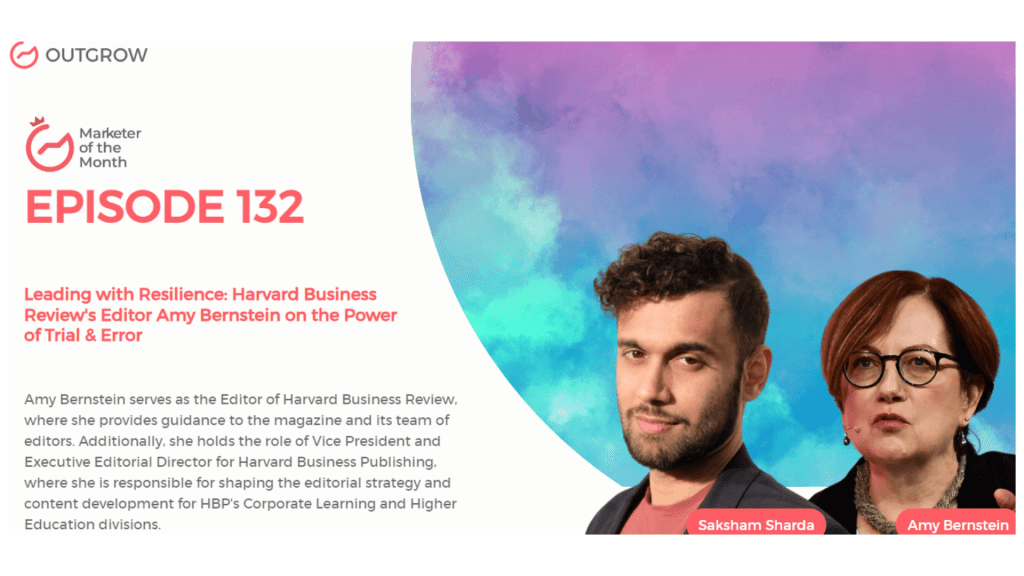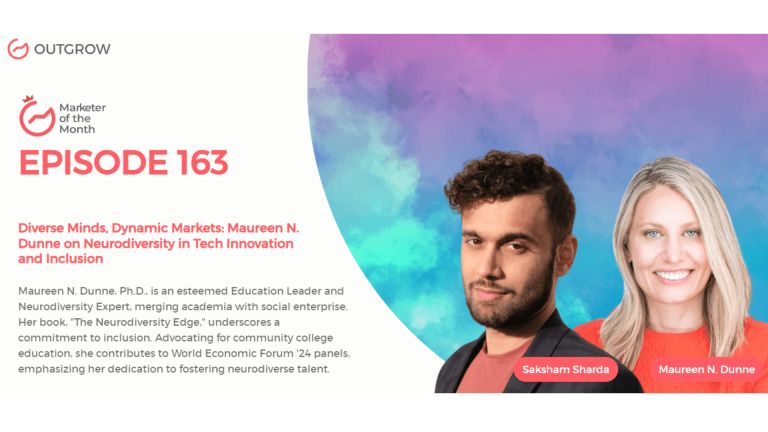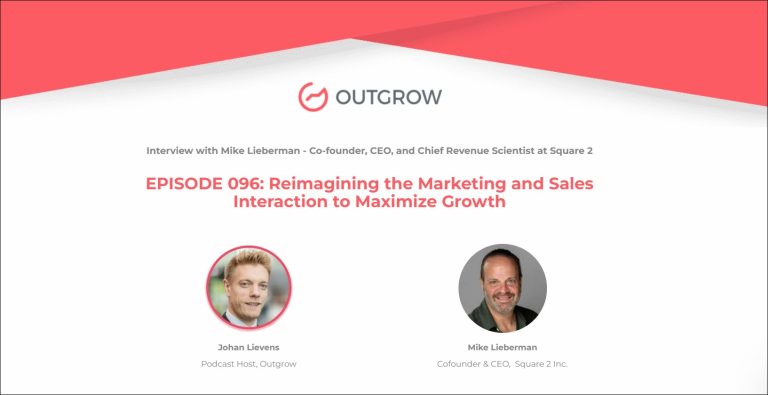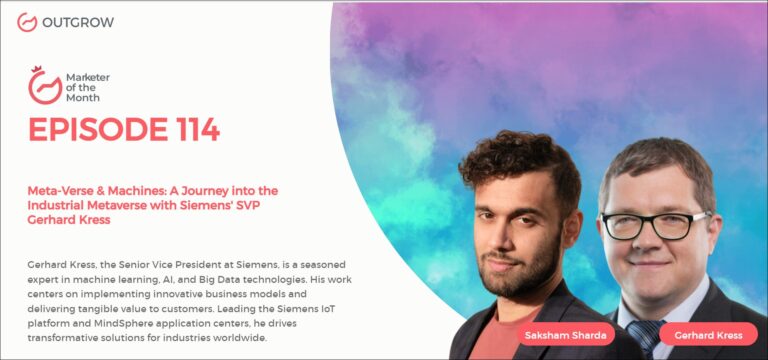EPISODE 132: Marketer of the Month Podcast with Amy Bernstein
Table of Contents
Hey there! Welcome to the Marketer Of The Month blog!
We recently interviewed Amy Bernstein for our monthly podcast – ‘Marketer of the Month’! We had some amazing insightful conversations with Amy and here’s what we discussed about-
1. Navigating Editorial Challenges: Building Trust and Enhancing Delegation.
2. Striking a Balance: Empowering the Team While Ensuring Quality.
3. Women in Leadership: Tackling Salary and Promotion Disparities through Bias Recognition and Remediation.
4. Bridging the Gap: Promoting Transparency and Diversity in Decision-Making.
5. Discovering Leadership: Embracing Trial and Error on the Path to Success.
6. Analyzing Supreme Court Rulings on Affirmative Action and HBR’s LinkedIn Triumph.
7. Serving the Audience: A Crucial Component of HBR’s Success in the Digital Age.
About our host:
Dr. Saksham Sharda is the Chief Information Officer at Outgrow.co. He specializes in data collection, analysis, filtering, and transfer by means of widgets and applets. Interactive, cultural, and trending widgets designed by him have been featured on TrendHunter, Alibaba, ProductHunt, New York Marketing Association, FactoryBerlin, Digimarcon Silicon Valley, and at The European Affiliate Summit.
About our guest:
Amy Bernstein serves as the Editor of Harvard Business Review, where she provides guidance to the magazine and its team of editors. Additionally, she holds the role of Vice President and Executive Editorial Director for Harvard Business Publishing, where she is responsible for shaping the editorial strategy and content development for HBP’s Corporate Learning and Higher Education divisions.
Leading with Resilience: Harvard Business Review Editor Amy Bernstein on the Power of Trial & Error
The Intro!
Saksham Sharda: Hi, everyone. Welcome to another episode of Outgrow’s Marketer of the Month. I’m your host, Dr. Saksham Sharda, and I’m the creative director at Outgrow. co. And for this month we are going to interview Amy Bernstein, who is the Editor of Harvard Business Review.
Amy Bernstein: Great to be here. Thank you.
Don’t have time to read? No problem, just watch the Podcast!
Or you can just listen to it on Spotify!
The Rapid Fire Round!
Saksham Sharda: Alright, let’s start with the rapid-fire round. So, at what age do you want to retire?
Amy Bernstein: 67.
Saksham Sharda: How long does it take you to get ready in the morning?
Amy Bernstein: 10 minutes.
Saksham Sharda: Most embarrassing moment of your life?
Amy Bernstein: Oh God most embarrassing, when I asked a woman when her baby was due and she wasn’t pregnant.
Saksham Sharda: What time of day are you most inspired?
Amy Bernstein: Morning.
Saksham Sharda: How many hours of sleep can you survive on?
Amy Bernstein: Five.
Saksham Sharda: Fill in the blank. An upcoming journalism trend is _____.
Amy Bernstein: An upcoming journalism trip is exciting.
Saksham Sharda: The city in which the best kiss of your life happened.
Amy Bernstein: Washington DC.
Saksham Sharda: Pick one, Mark Zuckerberg or Elon Musk?
Amy Bernstein: Mark Zuckerberg.
Saksham Sharda: The biggest mistake of your career?
Amy Bernstein: I didn’t check something carefully enough and I live to regret it.
Saksham Sharda: How do you relax?
Amy Bernstein: Reading.
Saksham Sharda: How many cups of coffee do you drink per day?
Amy Bernstein: Two to three.
Saksham Sharda: A habit of yours that you dislike?
Amy Bernstein: Procrastinating.
Saksham Sharda: The most valuable skill you’ve learned in life?
Amy Bernstein: Resilience.
Saksham Sharda: Your favorite Netflix show?
Amy Bernstein: I’m into Apple right now, Ted Lasso.
Saksham Sharda: The last film that you saw that had a good impression on you.
Amy Bernstein: All About Eve.
Saksham Sharda: The last song you’ve been listening to?
Amy Bernstein: The last song I’ve been listening to was Willin.
Saksham Sharda: That’s the end of the rapid-fire round. We want to do the longer questions that we can answer as you’d like.
The Big Questions!
Saksham Sharda: So the first one is, can you share a specific example of a time when you struggled with delegation and trust as an editor at HBS, and how you eventually overcame those challenges?
Amy Bernstein: Yes, when I first became the editor of Harvard Business Review, I used to edit every single article as if I were the developing editor rather than the top editor. I realized very quickly that this was unsustainable and that I needed to trust the editors who were all very good at doing what they did best. And once I realized that everything went more smoothly. And what I realized is that there are many ways to get to the goal, and mine is not the only one.
Saksham Sharda: And what steps did you take to build this trust and strength of the delegation process?
Amy Bernstein: It was the steps involved in self-reflection and stringent honesty with myself. So I had to understand the problem. That is to diagnose the problem, recognize my role in it, and then figure out how I was going to solve it.
Saksham Sharda: And have you ever found it hard to strike a balance between empowering your team members and maintaining quality control?
Amy Bernstein: Yes, I have. But I learned in the course of doing that if you work with the best people, you can trust them completely to do the job.
Saksham Sharda: So in the context of salary critique, you expressed optimism about women moving into positions of authority. How do you believe that presence in decision-making roles will impact salary and promotion disparities?
Amy Bernstein: I believe that when women move into positions of power, they will recognize when bias enters the compensation discussion and will not only recognize it, but I certainly hope they will call it out and rectify it.
Saksham Sharda: What specific measures or changes do you think need to be implemented to address salary and promotion disparities?
Amy Bernstein: Well, having transparency in salary levels and bands is important. I have some concerns with the whole question of whether or not we should all be sharing our salaries because I think that’s going to force a race to the bottom, that we will correct the lower salaries, not the higher salaries. But I do think transparency on pay levels will help. I also think having diversity in the decision-making processes, diversity of voices, and perspectives in the decision-making process will help.
Saksham Sharda: Could you tell us about your favorite piece published by the Harvard Business Review and why it resonates with you?
Amy Bernstein: Yes, I’ve cited the authenticity paradox by Herminia Ibarra of London Business School. What I love about this piece is that it challenges the whole notion of keeping it real and being true to yourself when you are a new leader, or any leader trying to figure out what your values are, what you stand for what she says is keeping it real, it’s just an excuse for not growing, I believe that. What she also says is you can’t know who you are as a leader until you’ve tried on several different personas, and you understand what feels right to you. So it’s a sort of ‘fake it till you make it’s idea. But it has worked for me.
Saksham Sharda: It was more of a trial and error.
Amy Bernstein: Exactly. I would never say don’t be true to yourself. But if you don’t know where you are comfortable and what your values are yet, then you should try a few approaches out.
Saksham Sharda: And do you feel like official environments tried to restrict you from experimenting with your persona because of societal pressures or anything?
Amy Bernstein: I think in general, we are told to follow our passions and to be true to ourselves. That sets up an expectation that we know ourselves in any given context and having values I don’t think your values are not necessarily context-dependent. But your behavior might be context-dependent. And you have to figure out how all the different factors work together for you.
Saksham Sharda: So how does this influence your perspective on a particular topic or issue?
Amy Bernstein: Well, for one thing that made me way more comfortable, as a leader, and it has helped me as I coach others, it has helped me develop more empathy for others who are growing into their leadership styles. I have found it enormously valuable ever since we published it several years ago.
Saksham Sharda: In what ways would you describe the personal and professional growth that you have experienced through posting to women’s network podcasts?
Amy Bernstein: It’s been such an amazing experience. One of the things that the “Women at Work podcast” has done is it’s made me more comfortable speaking as myself too, you know, more publicly. We usually, you know, just as editors and Harvard Business Review, in particular, we’re a little impersonal and we don’t step into the spotlight. This has helped me a lot with that. It’s helped me connect with people I wouldn’t have connected with otherwise. It puts me in closer touch with our audience, and our readers, and helps me understand how the work we do affects them and how it influences them. And I’ve made some amazing friends from this experience, our co-hosts, people who I care about.
Saksham Sharda: Is there any interesting story or anecdote that comes to your mind now?
Amy Bernstein: I did form a friendship with one of our guests, someone who’s been on quite a lot, who when I first met her, she’s a woman of deep insight and very strong views. And when she first came on our show, we were discussing race. And some stuff that she said, kind of stuck with me. I felt that what she was saying was a little unfair to me as a white woman. And as I came to know her, I understood where she was coming from. I respect her courage in articulating a view that could have rubbed a lot of people the wrong way. I get it. And we’ve become pretty good friends.
Saksham Sharda: We want to be on the topic that the Supreme Court announced this morning that it wants to strike down on how words are not aligned with actual policy.
Amy Bernstein: Well, what I have to say is that there’s usually more nuance to these decisions than we understand but how they get picked up, is the important thing in certain ways. I need to read the decision, what I will more likely do is read the New York Times and you know, The Economist and all the other places I go to understand this decision. However, I believe that affirmative action has been enormously important in leveling the playing field in the United States. And I don’t think you can leave the work of equity. I think the work of equity still needs the government’s official push. And so let’s see what this decision says. But, in general, I would hate to lose affirmative action as a force for good.
Saksham Sharda: Do you have any opinions on why Harvard Business Review has managed to do so well on LinkedIn in recent times?
Amy Bernstein: So well, on LinkedIn. I think it’s because we are very good at understanding what our audience is thinking about, what worries them, that we understand ambition, we understand why people who are trying to develop in their careers as managers and leaders, we understand how they think we want to help them do it. The spirit of our work is really about being useful and helpful. We never want to tell people what we are and what they already know. You know, we’re in it for them. And I think they know that. And by them, I mean, our audience, our readers.
Saksham Sharda: So you mentioned earlier that you go to the New York Times and The Economist to read about the news. Where else do you go besides that?
Amy Bernstein: Well, every morning, my pattern is my habit. I read The New York Times, the Financial Times, The Wall Street Journal, and if I have time, I read The Washington Post. And then I check in on the news all the time, I get feeds like everyone else. The Economist every single weekend, I put time aside to read that. And then, you know, whatever strikes me, I’ll read it. I love pop. I love Semaphore and some of the other newer outlets, great analysis, the Huffington Post. So that’s sort of I have my staples, and then I have my sort of regular samples.
Saksham Sharda: Looking ahead, what are your hopes and aspirations for the future of leadership and workplace dynamics? What changes would you like to see?
Amy Bernstein: I’d like to see more equity. I’d like to see greater inclusion. I’d like to see workplaces that don’t just look like the customers they serve, but where decision-making is done by people who look like the customers those organizations serve. I believe that business can be a tremendous force for good and I want to see that continue to happen. And when businesses and organizations think beyond their narrow profit motive, they can do an awful lot of good in the world. So I’d love to see more of that.
Saksham Sharda: So considering your experiences and insights, what advice would you give to aspiring editors and managers who are just starting their careers in the publishing industry?
Amy Bernstein: Well, I would say, expose yourself to as many experiences as possible, read as much as you can, listen to as much as you can, keep an open mind. Push yourself outside your comfort zone, and make yourself available. And always try to do more than you’re comfortable doing. That’s what I mean by pushing yourself outside your comfort zone, don’t be afraid to fail. The important thing is how you handle failure. Everyone screws up now and then.
Saksham Sharda: Any three common mistakes people who enter this industry intend to make?
Amy Bernstein: Such a good question, common mistakes, I’ll see if I can come up with three of them. Thinking you know, everything you need to know. So arrogance is a problem. Not being willing to do the work you don’t necessarily want to do is another form of arrogance that there’s entitlement and acting from a place of fear and self-protectiveness.
Saksham Sharda: How does the Harvard Business Review continue to grow its audience and how do we think about younger professionals?
Amy Bernstein: Well, we have a vibrant online presence of an amazing team that is constantly innovating. We love to jump into new platforms and sample them, we are reaching out to earlier career professionals via those platforms. We’re trying different kinds of branding. What we’re searching for is a way to be relevant and useful to people earlier in their careers and to reach them where they are, we don’t expect them to buy the physical magazine. But if they’re hanging out on TikTok, if they’re hanging out on Instagram, wherever they are, we want to be there to serve them.
Saksham Sharda: Is there any use of AI that you’re seeing in the editorial stuff? Or is the HBR using it in any way?
Amy Bernstein: We’re talking about it. It’s a very hot topic right now, throughout the industry, everywhere throughout every industry. What we know is that our values don’t change that. Our authors and we are responsible for whatever it is we publish. And so the accountability does not change.
Saksham Sharda: Here’s the last question for you. What would you be doing in your life, if not this?
Amy Bernstein: Teaching.
Let’s Conclude!
Saksham Sharda: Thanks, everyone for joining us for this month’s episode of Outgrow’s Marketer of the Month. That was Amy Bernstein, who is the Editor of Harvard Business Review.
Amy Bernstein: Pleasure. Thanks for having me.
Saksham Sharda: Check out the website for more details and we’ll see you once again next month with another marketer of the month.

Muskan is a Marketing Analyst at Outgrow. She is working on multiple areas of marketing. On her days off though, she loves exploring new cafes, drinking coffee, and catching up with friends.







